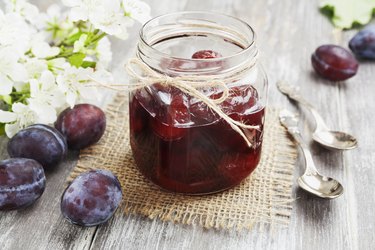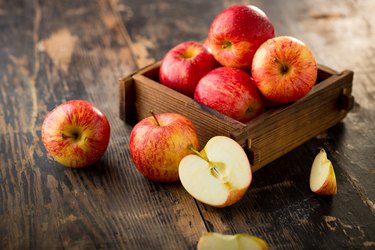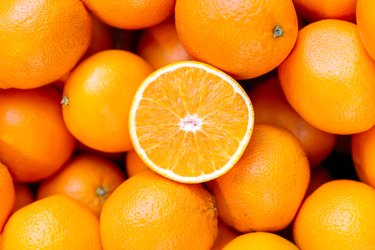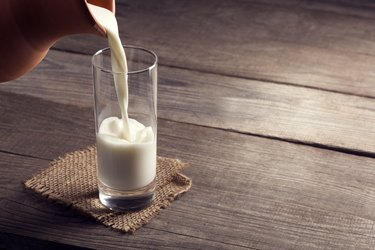You might be familiar with Boron from studying the periodic table of elements in high school chemistry. (Its symbol is B, in case you forgot.)
Boron is a trace mineral found in a variety of foods. Although experts aren't totally sure what boron does to the human body or if it plays much of a role in health, according to the National Institutes of Health (NIH), it might support reproduction and development, calcium and insulin metabolism, bone formation, brain function and immunity.
Video of the Day
Video of the Day
Adults get about 1 milligram of boron per day — with plant-based foods containing higher levels than animal products, according to the NIH.
How Much Boron Do You Need Per Day?
If you're wondering how much boron you should be getting, there isn't a recommended amount. Experts also don't yet understand if there are negative effects to getting too little and researchers are studying whether boron affects bone health and the ability to stay focused.
Your best bet for health is to eat a variety of foods, which will ensure you're getting the nutrients you need — boron included. Read on for a list of foods that contain the mineral boron and other important nutrients.
1. Prune Juice: 1.43 mg

Known for its, er, digestive properties, prune juice is one of the top natural sources of boron, with 1.43 milligrams per 1-cup serving. Prune juice, by the way, comes from prunes (which are dried plums) while plum juice comes from fresh plums.
Grape juice is also high in boron, providing 0.76 milligrams per 1 cup.
2. Avocado: 1.07 mg
Avocados contain pretty much every important nutrient out there, including fiber, healthy fat, plant-based protein, vitamin E, vitamin C and yes, boron. Just how much boron is in an avocado? A 1/2-cup serving, or roughly half an avocado, contains 1.07 milligrams of boron.
Try one of these creative avocado recipes for a nutrient boost.
3. Raisins: 0.95 mg
Raisins — a toddler's favorite snack — contain, well, mostly sugar. But the dried fruit also contains fiber and 0.95 milligrams of boron and a few B vitamins per 1 ounce. Raisins make a healthy, sweet topper to oatmeal, yogurt and salads.
4. Apples: 0.66 mg

An apple a day keeps the doctor away, or so they say. That might be thanks to its nutrients, including fiber, vitamin C and boron. A medium-sized apple contains 0.66 milligrams of boron.
Apples are versatile: Eat them as-is, mix into salads and oatmeal, or bake them and top with cinnamon for a warm snack or dessert. You can also try the fruit in these savory apple recipes.
5. Refried Beans: 0.48 mg
Beans are a nutrient powerhouse, and they go well with a variety of dishes. Vegetarians and vegans love them because they provide solid amounts of plant-based protein — 7 grams per 1/2 cup. A 1/2-cup serving also provides 0.48 milligrams of boron and 15 percent of your daily value of vitamin B6.
Unsure of how to use canned refried beans or canned beans? Try one of these easy, delicious (and nutritious!) bean recipes.
6. Peanut Butter: 0.46 mg
Peanut butter is a filling spread that goes with almost anything. A 2-tablespoon serving packs 0.46 milligrams of boron, 7 grams of plant-based protein and 13 grams of unsaturated, heart-healthy fat.
When choosing your peanut butter, be sure to read the labels. Your best bet is those with just peanuts (and maybe a little sea salt). Many brands include added oils and sugar, which can contribute to environmental and health concerns.
7. Oranges: 0.37 mg

Rich in immune-supporting vitamin C, oranges are a refreshing fruit that also contain 0.37 milligrams of boron per medium-sized orange. A 1-cup serving of orange juice, which is often fortified with important nutrients like calcium and vitamin D, contains 0.18 milligrams of boron.
Try the fruit in these immune-supporting orange recipes.
8. Broccoli: 0.2 mg
Perhaps the crown prince of vegetables, broccoli boasts high levels of vitamin C, fiber, fat-soluble vitamin K and boron — 0.2 milligrams per 1/2-cup serving.
You don't need to grit your way through soft, steamed broccoli, either: Season with salt and pepper, drizzle with olive oil and bake at 400 degrees for 15 minutes for a crispy, poppable snack or side dish.
9. Bananas: 0.16 mg
Bananas might be known for their potassium, but a medium-sized fruit also contains 0.16 milligrams of boron. Bananas provide 34 grams of carbohydrates, mostly from quick-acting sugar, which your muscles need for energy, especially exercise. They also have fiber and a little bit of protein.
Try the fruit in these creative banana recipes.
10. Coffee: 0.07 mg
One of the main sources of boron in American adults' diets is coffee just because we drink so much of it. One cup of coffee has 0.07 milligrams of boron. Enjoy the benefits of java by trying one of these healthy homemade coffee recipes.
11. Milk: 0.04 mg

Toddlers tend to get their boron from fruit juice and dairy, like milk, according to the NIH — 19 percent of their intake comes from milk and cheese.
One cup of whole milk contains 0.04 milligrams of boron as well as protein, calcium and, when fortified, vitamin D. The fat in whole (or reduced or low-fat) milk helps your body absorb fat-soluble vitamin D.
Was this article helpful?
150 Characters Max
0/150
Thank you for sharing!
Thank you for your feedback!